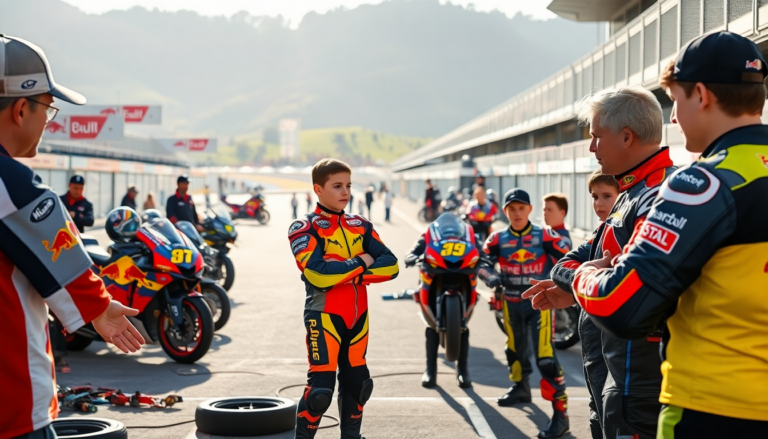Argomenti trattati
Coaching young racers is both a challenge and a rewarding experience. Experienced mentors like Kevin Schwantz have valuable insights on how to effectively guide aspiring athletes in a high-pressure environment. Understanding each child’s unique needs and motivations is key to fostering their growth and success on the track. So, how can coaches strike the right balance?
The Challenge of Coaching Young Talent
As young racers step into the competitive arena, such as the Red Bull Rookies Cup, they often find themselves under immense pressure to perform. Schwantz highlights that these athletes come with high ambitions, often riding the same machinery as their competitors, which only fuels their desire to excel. But here’s the catch: ambition can sometimes cloud their understanding of what it truly means to progress in racing. It’s not just about immediate results; it involves patience and a commitment to practice. Schwantz advises that young racers focus on finding their rhythm and pace, gradually honing their skills. The path to success is rarely straightforward; even legends like Casey Stoner have faced setbacks. As a coach, Schwantz’s role is to guide these young talents in recognizing that racing is a journey, and true mastery comes from consistent effort.
Furthermore, the coaching dynamic plays a pivotal role. Schwantz underscores the importance of tailoring the coaching approach for each racer. By riding alongside the kids, he gains a deeper understanding of their techniques and identifies areas for improvement. This hands-on experience facilitates effective post-session communication, where insights can be exchanged and confidence built. The contrast between coaching environments in the U.S. and international competitions further emphasizes the need for focused attention on each racer. In a more intimate setting, coaches can create a safe space for young talent to flourish, away from the pressures of the outside world.
Managing External Pressures
One of the most critical aspects of coaching young racers is managing the influence of parents and external pressures. Schwantz observes a wide range of parental involvement, from supportive to overly demanding. It’s crucial for coaches to recognize signs of stress in young athletes; some kids thrive in the sport simply for enjoyment, while others may feel overwhelmed by their families’ expectations. This pressure can take a toll, impacting both performance and overall enjoyment of the sport.
To tackle these challenges, effective communication strategies are essential. Coaches, including Schwantz, take proactive measures by engaging with parents when issues arise. While they can’t dictate how parents should behave, they can provide guidance and support to mitigate unnecessary stress. By fostering a collaborative environment, coaches can help create a balance that encourages young racers to pursue their passion without the burden of excessive expectations. Isn’t that what every young athlete needs?
Building a Supportive Environment
Creating a nurturing atmosphere where young racers can thrive is vital for their development. Coaches like Schwantz aim to build a team dynamic that values both improvement and enjoyment. By keeping the focus on learning and growth, they help cultivate resilience in young athletes, preparing them for the inevitable ups and downs of competitive racing.
In summary, coaching young racers requires a keen attention to individual needs, the management of external pressures, and the establishment of a supportive environment. As Kevin Schwantz illustrates, success in racing is not solely about speed; it’s about nurturing well-rounded, confident individuals who can navigate the complexities of the sport. This holistic approach not only enhances their immediate performance but also lays the foundation for lifelong skills and a lasting passion for racing. So, are you ready to support the next generation of racing stars?

